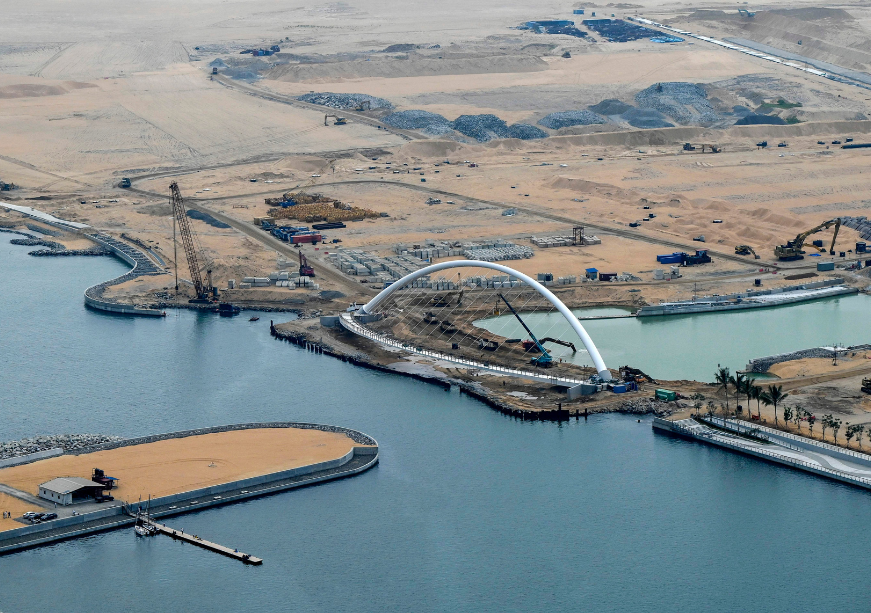-
CENTRES
Progammes & Centres
Location
The recent inclusion of Bangladesh in the CSC demonstrates the increasing importance and role of the CSC as the Indo-Pacific region grows in prominence

The Colombo Security Conclave's (CSC) 8th Deputy National Security Advisor-level summit on 10 July witnessed Bangladesh officially joining the organisation as its fifth member. The latest development demonstrates the increasing importance and role of the CSC as the Indo-Pacific region grows in prominence. Since its revival in 2020, the CSC has seen an expansion in membership and has undertaken multiple initiatives to promote and institutionalise a security architecture in the region. In a rapidly evolving security environment, the CSC is facilitating the Indian Ocean littoral states to transit from a territorially-dominated security thinking to collaborate and cooperate on maritime threats and interests.
The CSC’s beginning traces to 2011, when India, Sri Lanka, and the Maldives launched their first trilateral National Security Advisor (NSA) level talks to discuss maritime challenges and threats and explore areas of collaboration.
The CSC’s beginning traces to 2011, when India, Sri Lanka, and the Maldives launched their first trilateral National Security Advisor (NSA) level talks to discuss maritime challenges and threats and explore areas of collaboration. However, a series of domestic developments and differences between India, Sri Lanka, and the Maldives halted these talks between 2014–2020. In 2020, there was a decision to expand the scope of maritime cooperation, elevate the NSA-level talks, and institutionalise them to the Colombo Security Conclave. Since then, Mauritius, Bangladesh, and Seychelles were added to the grouping, and a secretariat was established in Colombo in 2021. In 2022, Mauritius became a member of the organisation. An agenda of five pillars was adopted in the same year, which included maritime safety and security, countering terrorism and radicalisation, combating trafficking and transnational crime, cybersecurity, and protection of critical infrastructure and technology, and humanitarian assistance and disaster relief.
This push for institutionalisation and expansion of the CSC is an outcome of the evolving world order. As the Indo-Pacific region grows geoeconomically and geostrategically important, it is more prone to traditional and non-traditional challenges like growing geopolitical competition, trafficking, piracy, terrorism, cyber threats, and maritime disasters and accidents. As a result, littoral states of the Indian Ocean Region (IOR) have begun to push for a robust maritime security architecture. In this context, minilateral groupings have proliferated in the Indian Ocean. Notably, this is a phenomenon across maritime spaces, as the domain warrants cooperation and coordination to secure vital maritime interests, especially with island nations lacking the capacity to secure seas and counter transnational threats.
Even though the Indian Ocean Rim Association (IORA) continues to operate as the only pan-Indian Ocean regional forum, its operations have been limited, often receiving scrutiny. Furthermore, given the complex nature of these spaces, a multilateral arrangement seems inadequate in accommodating the interests of all the players involved. Towards this end, the CSC's scope remains within the immediate geography of its member states. In fact, with Bangladesh joining the CSC as a full member, the CSC appears to represent a new construct—a ‘maritime imagination of South Asia,’ underscoring Dhaka’s reimagination as a vital Indian Ocean state. For the CSC members, it offers an opportunity to pursue cooperation across an interlinked geography, ranging from the Western Indian Ocean to the Bay of Bengal.
Even though the Indian Ocean Rim Association (IORA) continues to operate as the only pan-Indian Ocean regional forum, its operations have been limited, often receiving scrutiny.
From India’s point of view, the expansion of the CSC and the induction of Bangladesh appears to be a welcome development. Similar to its smaller neighbours, India is keen on promoting a cooperative and collaborative environment in its maritime neighbourhood, specifically through its Security and Growth for All in the Region (SAGAR) vision. This collaborative approach is vital to maintain its influence and presence in the IOR and to promote its security. The CSC thus offers an opportunity for an institutional framework to advance maritime security cooperation. This development is important on two accounts. First, to counter China’s presence in the Indian Ocean. In fact, the China-Indian Ocean Forum initiated in 2022 emerged as a competing regional forum that could challenge Delhi's role as a catalyst in framing maritime security cooperation. Second, the member states involved in the CSC are vital partners in ensuring India’s maritime security. With the possibility of China paring away Delhi's neighbouring states, institutionalising a maritime security architecture could strengthen India’s efforts in securing its immediate maritime neighbourhood, promoting better defence and security cooperation with neighbours, and sensitising them to India’s concerns.
With mutual interests to revive and expand CSC, there has been a significant uptick in their activities. The organisation hold regular NSA- and Deputy NSA-level meetings, with the former deciding on a roadmap for the organisation and the latter overseeing the implementation of decisions. Under its Maritime Security pillar, in 2022, the CSC organised its first oceanographic and hydrographic conference and conference on coastal security.
The former conference has made significant progress since then. A second iteration of the conference was also held in January this year. It is attended by heads of Oceanography and Hydrography Institutions to review cooperation in the respective fields and explore areas of further collaboration. Some of these areas of cooperation being explored include institutional linkages, joint expeditions, scientific research, assessment of the environmental impact of maritime accidents, desalination, coastal management, and ocean observations. Scientists have even begun collaborating on expeditions in the Antarctic and Indian Ocean Region. An Ocean Information Services Portal was also launched in 2023 to promote collaboration and facilitate the exchange of oceanographic information.
The former conference has made significant progress since then. A second iteration of the conference was also held in January this year.
On the other hand, the latter conference brings together the heads of coastguards and other stakeholders to discuss maritime and coastal threats and explore ways to promote information sharing. The second edition of the conference is scheduled for later this year. Similarly, members of CSC have investigated cases of terrorism, terror financing, trafficking, cybersecurity and crime, and marine pollution. There is also a push for capacity-building initiatives for police officers, counter-terrorism experts, drug and law enforcement officials, and cyber security experts, alongside workshops on Maritime Law. Members of CSC are also either operating or are proposing joint working groups on some of these issues.
While the consolidation of CSC seems apparent with the expansion of its membership, two critical challenges continue to loom over the forum. The first challenge pertains to China. The members of the CSC have varied and complex relations with China. For New Delhi, China’s enduring territorial and maritime expansion and the weaponisation of the ocean remain a pivotal challenge. Beijing’s growing naval footprint in the Indian Ocean has long cautioned India’s strategic thinking in its primary area of interest. However, other countries like Sri Lanka, Maldives, Mauritius, and Bangladesh have close economic and defence ties with China. In cases such as Sri Lanka, Maldives, and Mauritius, extensive economic reliance and borrowing from China has also triggered anxieties of more Chinese debt-trapping in the IOR. These varying perceptions and increasing cooperation with China will pose a crucial challenge for the CSC.
A second challenge emanates from the fact that all the members of the CSC are democracies whose foreign policy is vulnerable to domestic politics. The organisation's six-year halt from 2014-2020 and the Maldives’ absence from the previous NSA-level meeting further underscores this challenge. While the increase in memberships and the Maldives’ participation in the latest Deputy NSA talks indicate that countries understand the importance of CSC and maritime security cooperation, the role of domestic politics in the functioning of this organisation cannot be ruled out. After all, the region’s domestic politics continues to thrive on promoting anti-Indian sentiments and politicising defence cooperation with India.
However, even when the challenges for CSC draw concern, it is important to appreciate some views on future pathways for the forum. The maritime geography involving CSC is critical for non-traditional security challenges. While the China question may draw disagreement or a lack of consensus within the CSC, the enduring insecurity prompted by climate change-induced environmental challenges, piracy, and maritime terrorism, IUU fishing should lead to cooperation within the forum. Additionally, for India, given that the CSC is a National Security Advisor-level forum, the maritime focus reinstates the view that the making of a maritime South Asia is underway and that national security is increasingly viewed through a maritime prism, going beyond a territorial idea of the same.
Sayantan Haldar is a Research Assistant at the Observer Research Foundation
Aditya Gowdara Shivamurthy is an Associate Fellow at the Observer Research Foundation
The views expressed above belong to the author(s). ORF research and analyses now available on Telegram! Click here to access our curated content — blogs, longforms and interviews.

Sayantan Haldar is a Research Assistant at ORF’s Strategic Studies Programme. At ORF, Sayantan’s research focuses on Maritime Studies. He is interested in questions of ...
Read More +
Aditya Gowdara Shivamurthy is an Associate Fellow with the Strategic Studies Programme’s Neighbourhood Studies Initiative. He focuses on strategic and security-related developments in the South Asian ...
Read More +